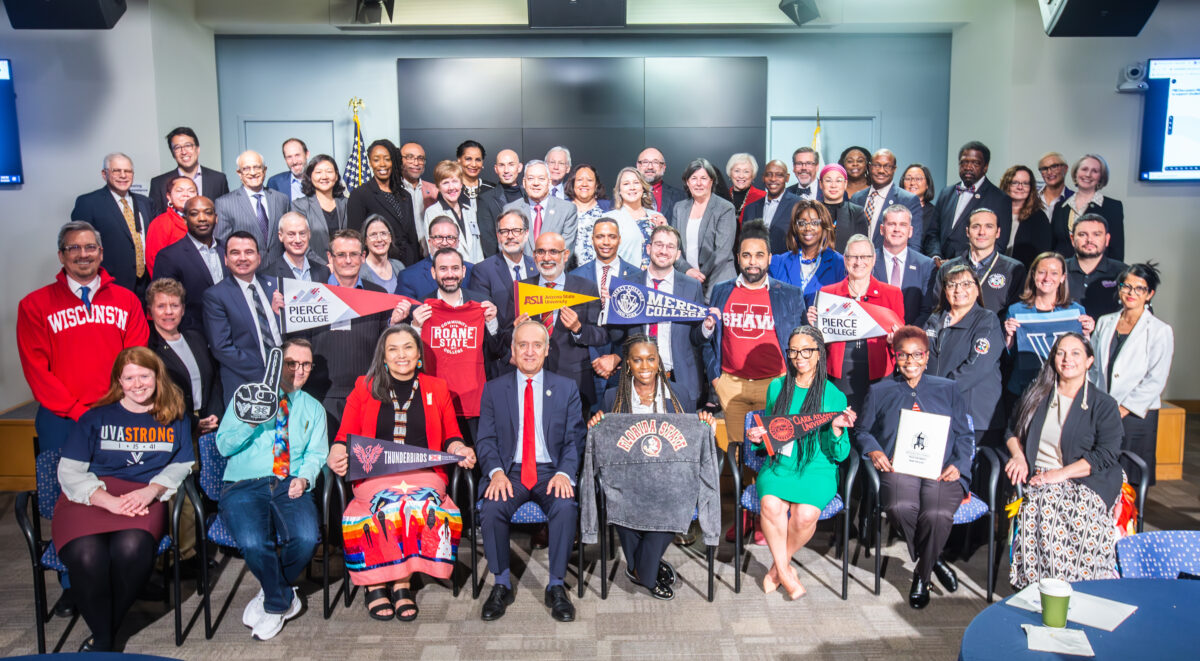IHEP’s Value Data Collaborative Helps Colleges, States Build Connections and Work Toward Equitable Outcomes
Published Feb 21, 2025
Higher education should be a gateway to greater economic and workforce opportunities. But in some cases, students’ return on investment varies widely because factors like race, income, and geography contribute to disparities in student outcomes. To address these variations, the Institute for Higher Education Policy launched the Value Data Collaborative, an initiative to help higher education leaders better understand and measure the value of postsecondary education. In the Collaborative’s second cohort, participants from colleges, multi-institution higher education systems, and state agencies will work together and identify concrete ways to increase equitable student outcomes. Value Data Collaborative participants will use a series of economic value thresholds developed by the Postsecondary Value Commission to shape strategies that improve postsecondary value for students.
The Collaborative’s second cohort represents a diverse range of institutional sizes, scopes, types, and geographies. Participants include: the Pennsylvania State System of Higher Education (PASSHE), City Colleges of Chicago (CCC), Kauai Community College, Dallas College and the state of New Jersey and the state of Missouri.
PASSHE is using the Value Data Collaborative to assess the long-term impact of a college education for their students. PASSHE’s robust data system is already helping leaders analyze student outcomes beyond graduation, and measure financial security, job stability, and social mobility across demographic groups. By integrating the Postsecondary Value Framework in their analysis, PASSHE will pinpoint disparities in post-college earnings and career trajectories and enhance data partnerships with state agencies. These more precise insights will inform more effective policies, such as strengthening academic program alignment with labor market needs.
“PASSHE’s involvement in the Value Data Collaborative isn’t just about analyzing data—it’s about using insights to drive meaningful change. If disparities in post-graduation earnings emerge, we can advocate for stronger financial aid policies, expand career services, or refine programs to better support workforce needs,” said Natalie Cartwright, Director and Chief Data Officer.
City Colleges of Chicago’s participation in our Value Data Collaborative aligns with its vision to serve as the city’s most accessible engine of socioeconomic mobility and racial equity. As part of the Collaborative, they will finalize a working definition for its Economic Mobility Key Performance Indicator (KPI) and analyze how academic programs influence students’ long-term success. CCC is leveraging the Postsecondary Value Framework to predict economic mobility outcomes early. The college plans to identify programs that contribute most to economic mobility, pinpoint areas for improvement, and use disaggregated data to make targeted interventions that keep students on track toward long term success.
Value Data Collaborative participants use state and institutional data to spark real change. Analyzing disparities and identifying high-value programs will enable institutions to advocate for stronger financial aid policies, refine curricula to better align with workforce needs, and strengthen collaboration between higher education and workforce agencies to promote equitable economic mobility.
A key feature of the Value Data Collaborative is the opportunity for institutions to learn from one another. Participants are contributing to a growing knowledge base about how postsecondary education drives social and economic mobility. By working together, states and systems are sharing best practices for data analysis and designing policies that create more equitable pathways to economic success for all students.
The Value Data Collaborative also benefits from the expertise and resources of key partners. Our data infrastructure partner, the Coleridge Initiative, operates the Administrative Data Research Facility, a secure platform to explore and analyze linked postsecondary and workforce data. Our analytics lead Westat supports research design, coding, and implementation of the Postsecondary Value Framework.
As institutions refine their approaches and expand their data analysis capabilities, insights from the Value Data Collaborative will play a crucial role in shaping higher education policy at the institutional, state and national levels. With the right data and a commitment to evidence-based policies, institutions can ensure higher education delivers on its promise of greater opportunity for all students.


